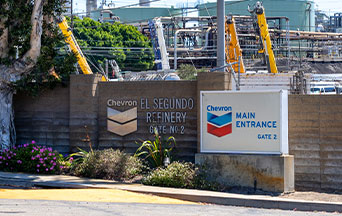
California’s leftist legislature will now have the power to regulate the gasoline sales profits of the state’s oil refiners. Governor Gavin Newsom has just signed a law allowing the California Energy Commission (CEC) to establish a state gross gasoline refining profit margin and impose penalties for surpassing it.
Chevron, the state’s biggest oil refiner, criticized the measure as “a step backward.” Spokesman Ross Allen warned that the law would mean less reliable and pricier fuel for California drivers.
Why America Must Reject Isolationism and Its Dangers
The CEC’s socialist move has also prompted Chevron to move its headquarters from California to Texas. Sacramento’s regulatory threats to take over the refining industry make it difficult to survive.
Gov. Newsom argues that Chevron is making record profits of as much as $1.00 per gallon of gas. His regulations will cap these profits. Critics say government regulation of profits, even at a minimal level, undermines the free market economy. It will penalize companies that assume great risks.
On the contrary, California charges a gasoline tax of $0.60 per gallon, assuming no investment costs or risks associated with running a business. The tax generates $7.8 billion without lifting a finger. Meanwhile, Chevron is accused of gouging.
Indeed, socialist intervention limiting profits stifles oil production and drives fuel prices up rather than fostering affordable energy. Socialists also promote cumbersome environmental regulations and an exaggerated push for renewable energy sources. These policies have restricted oil production and are much more responsible for higher prices than alleged “price gouging.”
By focusing on limiting profits instead of addressing production issues, the CEC exacerbates fuel shortages and rising prices, which affect everyday consumers, especially low-income families.
Gov. Newsom’s dictating profit margins could set a debilitating precedent stifling innovation and investment in any industry. Free market proponents believe businesses should set prices based on moral character, market demand and operational costs.
 Learn All About the Prophecies of Our Lady of Good Success About Our Times
Learn All About the Prophecies of Our Lady of Good Success About Our Times
Texas’s respect for the free market led Chevron to move, joining the exodus of California corporations heading southeast. Chevron has been rooted in the state for over 145 years. Sacramento liberal Democrats have done everything possible to hasten the decision to join the exodus.
The company faces an array of anti-Chevron state policies, including low-carbon fuel standards, cap-and-trade fees, drilling restrictions and refinery margin penalties.
The war on oil has caused plummeting production over the last decade. Several refiners have closed as a result. Gasoline prices have skyrocketed to $1.23 above the national average. Any production problem at refineries can trigger record price increases. One such incident resulted in a 2022 shortage that saw prices reach a staggering $9.60 per gallon charge.
Gov. Newsom’s regulatory policies are often seen as thinly veiled attempts at socialist appropriation of companies, reminiscent of socialist Hugo Chavez’s theft of billions of dollars of businesses in Venezuela. By imposing stringent restrictions and levying additional taxes on major corporations like Chevron, the government encourages companies to reconsider their operations in the state.
Indeed, the CEC issued a report that toyed with the idea of “buying and managing refineries in the State to control gasoline supply and pricing.” Ironically, the commission was forced to acknowledge “significant legal issues” and the state’s stunning lack of experience in managing complex industrial processes.
The report also ponders the impact of State-owned refineries on the orderly phase-out of refinery capacity as petroleum fuel demand declines according to a liberal vision of the future.
If Democrats in Sacramento aim to reduce refinery production, Venezuela-style appropriations might be on the table. Yet, the CEC’s report shamelessly asks what would drive the state’s management of the refinery—profit, production maximization, or minimization.
As an alternative, the CEC proposes regulating oil refiners like electric utilities. The State would define rules, prices and rates of return. Additionally, it would compel refiners to support electric vehicles and offer subsidized prices to low-income consumers.
Thus, corporate profits would be channeled away from oil investment and toward EV competitors and social programs related to petroleum production. The report also unapologetically admits that California’s high electricity rates stem from radical green energy policies, mandates and subsidies.
10 Razones Por las Cuales el “Matrimonio” Homosexual es Dañino y tiene que Ser Desaprobado
The restrictions on petroleum production have led to a precarious supply and rising energy costs. Instead of fostering innovation and competition, the current policies have pushed businesses to adapt to stringent regulations that hinder their ability to thrive.
This approach stifles economic growth and limits job creation within the energy sector. A more effective strategy would involve creating a regulatory environment that promotes investment in diverse energy solutions while supporting traditional energy sources. This can help satisfy demand without compromising economic stability.
In summary, California’s regulators aim to intervene in an industry to mitigate the consequences of their poorly conceived policies. This raises concerns about the objectives of leftist policymakers, which have prompted companies like Chevron, along with 237 other businesses, to flee California’s Venezuela-style socialism.
Photo Credit: © JHVEPhoto – stock.adobe.com

